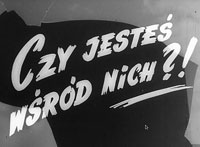 Czy jesteś wśród nich?
Czy jesteś wśród nich?
Poland, 1954, black and white, 8 mins
To a British viewer of a certain age, Are You Among Them? will look extremely familiar, as it’s the exact Polish equivalent of one of those stern finger-wagging lectures masquerading as ‘public information films’ that the Central Office of Information churned out in vast quantities from the mid-1940s onwards. “Are you among them?” asks the title over a shot of a recently-broken window, “them” being someone whose miscreant behaviour ranges from petty vandalism to litter-dropping to a failure to queue properly at the bus stop.
We first see a party in a Warsaw square, with young people dancing, playing music and generally enjoying themselves (“this is poetry”, says the commentator). But in the morning, hapless cloth-capped workers have to clean up after them (“this is prose”). A nameless yob walks along the street, spitting out the remnants of the cherries he’s eating. In a rather implausible bit of slapstick staging, a woman walks nonchalantly out of a building, slips on one as though it was a particularly potent banana skin and falls on another, soiling her previously immaculate white dress. But there’s an amusingly unsubtle punchline as the yob suddenly rediscovers his conscience, only to slip on a third cherry and bang his head on a litter bin (but of course!).

It’s not just in the streets that people are thoughtless: housewives cause chaos as their gossiping leads them to leave taps and showers running, causing the limited water supply to run out elsewhere and forcing one man to shave with the aid of a soda siphon. Worse still is the “scruffy housewife” who overflows the sink upstairs, causing water to drip through the floor right into her husband’s (already burnt) soup. It’s not made clear if that’s a worse crime than wrecking the ceiling.
And then there are graffiti artists (or “autograph lovers”), petty teenage vandals (shown smoking as they commit their crimes, though this probably wouldn’t have quite the same association with terminal delinquency to a Polish viewer in 1954), people who ignore Keep Off The Grass signs and steal flowers for loved ones (“This couple is especially dangerous in the spring”), people who fail to queue properly for buses, crushing women and children as they scramble to get on, and damaging the buses for good measure once they succeed (a rather cutesy bout of anthropomorphism crops up in a visit to a scrapyard, where damaged buses are “anxiously thinking about repair and return to service”). “Soon we are going to travel unsafely in the air”, predicts the commentary, though it’s unlikely Polish planes would tolerate quite so many people hanging off the sides.
You, the viewer, are of course not “among them”, and will duly be horrified by the statistics, presented on screen via punctuating zooms into garish tabloidesque headlines. If no buses were vandalised, Warsaw could afford twelve more. Trampled grass amounts to the cost of a whole new park each year. Sweeping up litter requires 7,000 dustcarts. One month’s wasted Warsaw water could fill 4,000 swimming pools. Housing estates could divert their repair bills to build 100 new rooms a year.

So far so amusing, but there are two more serious points to make, one of which forms the film’s coda: which is that because Warsaw suffered so much destruction during World War II, it’s singularly insensitive of its citizens to damage it further, especially as it’s still being rebuilt. And the other is that this is one of the first examples of what would later be known as the ‘Black Series’ (‘Czarna seria’), in which a group of young filmmakers began to break away from the idealised tenets of Socialist Realism in favour of hard-hitting explorations of social problems – directors Jerzy Hoffman and Edward Skórzewski (whose debut this was) would go on to direct some of the most important examples, beginning with Look Out, Hooligans! (Uwaga Chuligani!) the following year. Compared with that film’s far more complex and ambiguous presentation of a current social malaise, Are You Among Them? is ultimately just as simplistically didactic as any other documentary from the Stalinist era. But even here, the seeds of change are clearly beginning to be sown.
- Director/script: Jerzy Hoffman, Edward Skórzewski
- Camera: Bogdan Chamczyk
- Sound Editing: Marian Duszyński
- Narration: Andrzej Łapicki
- Production Company: Wytwórnia Filmów Dokumentalnych (Documentary Film Studio)
The film is included on PWA’s Polish School of the Documentary: The Black Series double-DVD set (Region 0 PAL). The source print is generally in very acceptable condition, relatively light on spots and scratches, tramlines and exposure fluctuations. The only consistent problem is an overall lack of contrast: I can’t believe the film was originally supposed to look this grey. The soundtrack is sometimes a bit muffled, but perfectly comprehensible given that it only consists of music and narration. The same is true of the subtitles, the muffling in this case coming from occasionally infelicitous phrasing.
Hi Michael,
It’s irrelevant but I didn’t know where to post it. Do you have any idea about this? http://ruscico.com/dvd.php?lang=en&dvd=463 It’s a big surprise as Ruscico hadn’t listed it in the upcoming DVDs. On the other hand, it has “DVD release: IV quarter 2000”.Do you know anything about it?
I’d literally just found out about it myself, after discovering that Kino’s new US release of the film was a clone of the Ruscico.
DVD Beaver reviews it here.